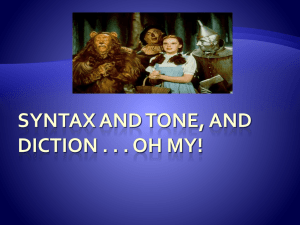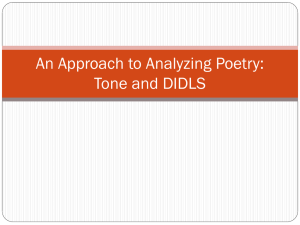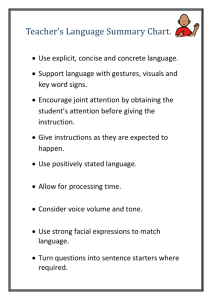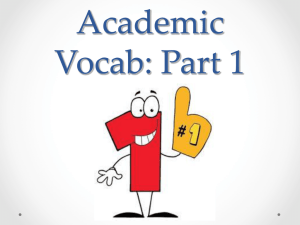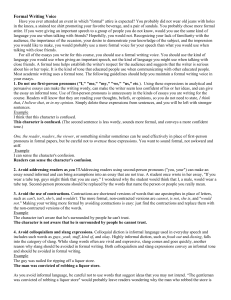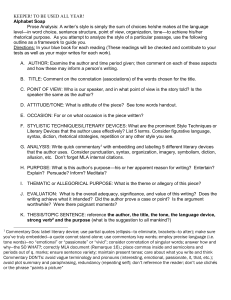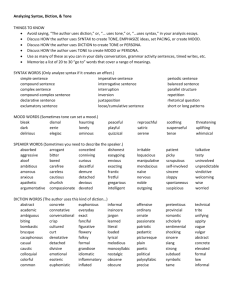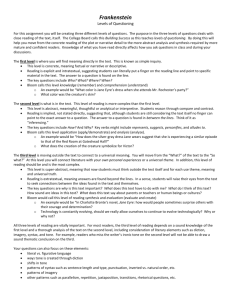Tone and Voice Tone is the mood or feeling the writer creates about
advertisement
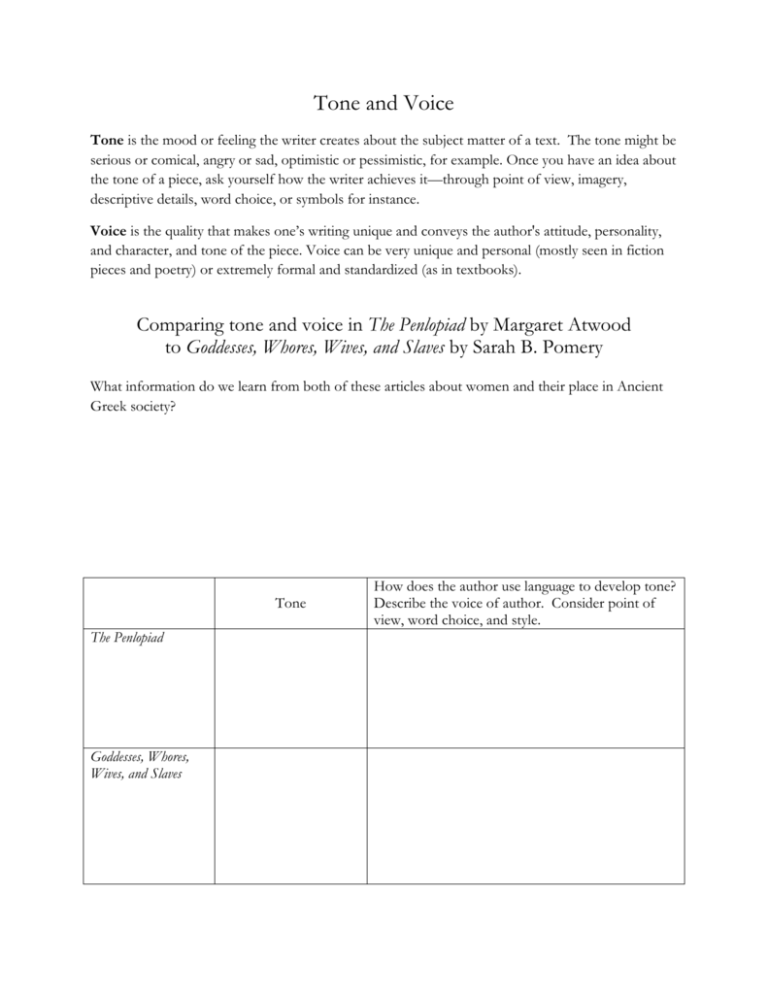
Tone and Voice Tone is the mood or feeling the writer creates about the subject matter of a text. The tone might be serious or comical, angry or sad, optimistic or pessimistic, for example. Once you have an idea about the tone of a piece, ask yourself how the writer achieves it—through point of view, imagery, descriptive details, word choice, or symbols for instance. Voice is the quality that makes one’s writing unique and conveys the author's attitude, personality, and character, and tone of the piece. Voice can be very unique and personal (mostly seen in fiction pieces and poetry) or extremely formal and standardized (as in textbooks). Comparing tone and voice in The Penlopiad by Margaret Atwood to Goddesses, Whores, Wives, and Slaves by Sarah B. Pomery What information do we learn from both of these articles about women and their place in Ancient Greek society? Tone The Penlopiad Goddesses, Whores, Wives, and Slaves How does the author use language to develop tone? Describe the voice of author. Consider point of view, word choice, and style. Essay Writing: A Serious Tone through a Formal, Academic Voice Have you ever attended an event in which "formal" attire is expected? You probably did not wear old jeans with holes in the knees, a stained tee shirt promoting your favorite beverage, and a pair of sandals. You probably chose more formal attire. If you were giving an important speech to a group of people you do not know, would you use the same kind of language you use when talking with friends? Probably not. Recognizing your lack of familiarity with the audience, the importance of the occasion, your desire to demonstrate your knowledge of the subject, and the impression you would like to make, you would probably use a more formal voice for your speech than what you would use when talking with close friends. For all of the essays you write, you should use a formal writing voice. You should use the kind of language you would use when giving an important speech, not the kind of language you might use when talking with close friends. A formal tone helps establish the writer's respect for the audience and suggests that the writer is serious about his or her topic. It is the kind of tone that educated people use when communicating with other educated people. Most academic writing uses a formal tone. The following guidelines should help you maintain a formal writing voice in your essays. 1. Do not use first-person pronouns ("I," "me," "my," "we," "us," etc.). Using these expressions in analytical and persuasive essays can make the writing wordy, can make the writer seem less confident of his or her ideas, and can give the essay an informal tone. Use of first-person pronouns is unnecessary in the kinds of essays you are writing for the course. Readers will know that they are reading your thoughts, beliefs, or opinions, so you do not need to state, "I think that," "I believe that," or "in my opinion." Simply delete these expressions from sentences, and you will be left with stronger sentences. Example I think it will be interesting to see how his talents affect him later on in the book. It will be interesting to see how his talents affect him later on in the book. (The second sentence is less wordy, sounds more formal, and conveys a more confident tone.) "One," "the reader," "readers," "the viewer," or something similar sometimes can be used effectively in place of first-person pronouns in formal papers, but be careful not to overuse these expressions. You want to sound formal, not awkward and stiff. Example From reading about Odysseus, “the man of twists and turns,” one can learn that being cunning is a good quality to possess. 2. Avoid addressing readers as "you." Addressing readers using second-person pronouns ("you, your") can make an essay sound informal and can bring assumptions into an essay that are not true. As with first-person pronouns, second-person pronouns can be replaced by words such as "one," "the reader," "readers," and "the viewer." Example: We learn that you can use [cunningness] to your advantage by outsmarting others. We learn that one can use [cunningness] to his/her advantage by outsmarting others. 3. Avoid the use of contractions. Contractions are shortened versions of words that use apostrophes in place of letters, such as "can't," "isn't," "she's," and "wouldn't." The more formal, non-contracted versions are "cannot," "is not," "she is," and "would not." You might be surprised by how much better a sentence can sound if non-contracted versions of the words replace the contractions. Example He tells his crew not to panic and explains how to defeat the Cyclops so that they won’t die. He tells his crew not to panic and explains how to defeat the Cyclops so that they will not die. He tells his crew not to panic and explains how to defeat the Cyclops so that they can escape death. Making your writing more formal by avoiding contractions is easy: just find the contractions and replace them with the non-contracted versions of the words. You can also change the verb to make the phrase positive, rather than negative as in the third sentence. 4. Avoid colloquialism and slang expressions. Colloquial diction is informal language used in everyday speech and includes such words as "guys," "yeah," "stuff," "kind of," "okay," and "big deal." Highly informal diction, such as "freak out" and "dissing," falls into the category of "slang." While slang words often are vivid and expressive, slang comes and goes quickly, another reason why slang should be avoided in formal writing. Both colloquialism and slang expressions convey an informal tone and should be avoided in formal writing. Example He led them to believe that they were o.k. He led them to believe that they were safe. 5. Avoid nonstandard diction. Nonstandard diction refers to expressions that are not considered legitimate words according to the rules of Standard English usage. Nonstandard diction includes "ain't," "theirselves," "hisself," "anyways," "alot" (the accepted version is "a lot"), and "alright" (the accepted version is "all right"). Most good dictionaries will identify such expressions with the word "Nonstandard." Because nonstandard expressions generally are not regarded as legitimate words, I mark these expressions in essays as examples of "inaccurate word choice." 6. Avoid abbreviated versions of words. For example, instead of writing "photo," "phone" and "TV," write "photograph," "telephone," and "television." 7. Avoid the overuse of short and simple sentences. While the writer might use formal diction in such sentences, too many short and simple sentences can make an essay sound informal, as if the writer is not recognizing that the audience is capable of reading and understanding more complex and longer sentences. Short and simple sentences can be used effectively in formal writing, but heavy reliance on such sentences reflects poorly on the writer and gives the writing an informal tone. Final Comments Do not confuse formal diction with presumptuous diction (the kind of language that seems intended mainly to impress readers) or jargon (the kind of language only familiar to people within a specialized field, such as computer technicians). Educated people have several different writing and speaking voices, and one voice is no more "genuine" than another. Instead, the different voices reflect choices based on the writing or speaking situation. Through your word choice in essays, you can portray yourself as an intelligent person who is aware of your audience. Imagine the kind of language that you might use in a job interview for an important job. With formal diction, you can express yourself clearly, accurately, and effectively, without relying on the kind of language that you might use in less formal situations. -Illinois Valley Community College Department of English
